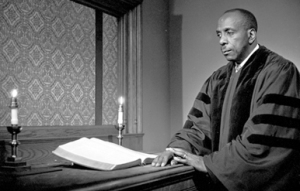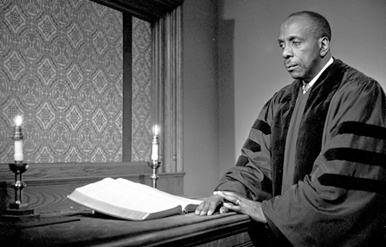
PHOTO: BU Photo Services, Howard Thurman
Originally published in The Catholic Times, March 8, 2015
“Have you read any of Howard Thurman?” my friend wanted to know. A student at Andover Newton Seminary, she was curious about my familiarity with this African American theologian, preacher, professor, and mystic. I’d never heard of him. “Really, Mary, you should read Thurman.”
Years later, as a participant in a spiritual guidance program, I’m finally discovering not only the writings of Howard Thurman, but also his profound influence on the non-violent civil rights movement in the United States.
A Baptist minister raised by his grandmother, a former slave, in segregated Daytona, Florida, Thurman’s first pastorate was at Mount Zion Baptist Church in Oberlin, Ohio. Later he moved on to become a professor at Morehouse and Spelman Colleges. He was Dean of Chapel at Howard University, but left in 1944 when he and Dr. Alfred G. Fisk, a Presbyterian minister and professor, founded the first interracial and culturally inclusive church in the United States: The Church for Fellowship of All Peoples. (This church remains active today in San Francisco and has as one of its central “commitments” the need for growth in understanding all people to be children of God. True then. True now.)
In 1953, he was named Dean of Marsh Chapel at Boston University, the first African American to hold that position in a predominantly white university. There he met Martin Luther King, Jr., who earned his PhD at BU. Thurman was his spiritual advisor and mentor, sharing the message of non-violence he had received from Gandhi on a visit to meet the Indian leader in 1936.
Over his lifetime, Thurman wrote twenty-one books and hundreds of sermons. One of his books, “Jesus and the Disinherited,” interpreted the gospels in light of non-violence and Jesus’ stand for those who had been deprived of their God-given rights. The book was foundational to the civil rights movement led by Dr. Martin Luther King, Jr. He is said to have carried this book with him during the Montgomery bus boycott and to have read from it on evenings before a march.
During his lifetime, Thurman disappointed some who wanted him to be more political, their “Moses,” but instead, saw him focus on prayer and the need for personal transformation and spiritual growth. This was necessary for social change, he said.
Just beginning to read Thurman, I’m not an expert on his thought or teachings, but this emphasis on prayer and spiritual discipline drew me to think about him as we immerse ourselves in Lenten observances.
He described religious experience as “the awareness of meeting God” that happens through all life, through nature, and through the arts. Spiritual disciplines are necessary for this to occur, Thurman says, since they “ready” our hearts and minds, our emotions and spirits to be open to God.
Describing the function of spiritual disciplines as “readying” us for an encounter with God resonates with me. We need to be ready to receive, no matter the gift.
“What else do we do to ready ourselves for something?” I pondered. Spring-cleaning has many benefits I’ve heard, and one is clearing film from windows, allowing light to pour through with more intensity. Students of nature study markings of birds, attributes of plants, and sea shell shapes and colors to increase their awareness of the variety that fills our world.
Have you ever studied pros and cons of cars before finally purchasing one? When you finish your ‘research,’ you recognize makes and models that you never noticed before.
Not having much background in classical music, pre-concert lectures on the pieces to be preformed enrich my experience. A special theater presentation of an exhibit of Rembrandt’s later works deepened my appreciation not only of his work, but also of the quiet beauty of the faces of people who fill my life.
This is how I imagine readying our spirits with disciplines of prayer and attentiveness encourages “religious experiences,” awareness of encounters with God. The process doesn’t invite God in. Rather, it helps us recognize where God already is.
I’m not sure this is what Thurman meant, but for now, I’m grateful for his phrase, “readying our spirits” and how it has deepened my Lenten prayer.
© 2015 Mary van Balen

Insightful, as always, Mary.
Thanks, Mike. amazing how many people who have played important parts in our country’s slow march toward equality remain unknown. Hope you’re having a good Lent.
What lovely way to describe prayer, Mary! I am going to forward your email to Lerita who is doing a workshop on Thurman at SDI this year.